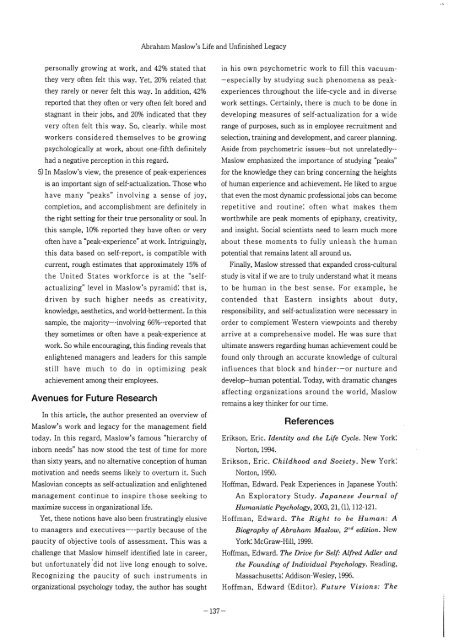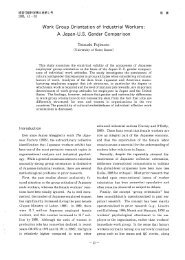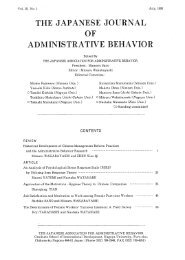Abraham Maslow's Life and Unfinished Legacy"
Abraham Maslow's Life and Unfinished Legacy"
Abraham Maslow's Life and Unfinished Legacy"
You also want an ePaper? Increase the reach of your titles
YUMPU automatically turns print PDFs into web optimized ePapers that Google loves.
<strong>Abraham</strong> <strong>Maslow's</strong> <strong>Life</strong> <strong>and</strong> <strong>Unfinished</strong> Legacy<br />
personally growing at work, <strong>and</strong> 42% stated that<br />
they very often felt this way. Yet, 20% related that<br />
they rarely or never felt this way. In addition, 42%<br />
reported that they often or very often felt bored <strong>and</strong><br />
stagnant in their jobs, <strong>and</strong> 20% indicated that they<br />
very often felt this way. So, clearly, while most<br />
workers considered themselves to be growing<br />
psychologically at work, about one-fifth definitely<br />
had a negative perception in this regard.<br />
5)In <strong>Maslow's</strong> view, the presence of peak-experiences<br />
is an important sign of self-actualization. Those who<br />
have many "peaks" involving a sense of joy,<br />
completion, <strong>and</strong> accomplishment are definitely in<br />
the right setting for their true personality or soul. In<br />
this sample, 10% reported they have often or very<br />
often have a "peak-experience" at work. Intriguingly,<br />
this data based on self-report, is compatible with<br />
current, rough estimates that approximately 15% of<br />
the United States workforce is at the "selfactualizing"<br />
level in <strong>Maslow's</strong> pyramid! that is,<br />
driven by such higher needs as creativity,<br />
knowledge, aesthetics, <strong>and</strong> world-betterment. In this<br />
sample, the majority—involving 66%-reported that<br />
they sometimes or often have a peak-experience at<br />
work. So while encouraging, this finding reveals that<br />
enlightened managers <strong>and</strong> leaders for this sample<br />
still have much to do in optimizing peak<br />
achievement among their employees.<br />
Avenues for Future Research<br />
In this article, the author presented an overview of<br />
<strong>Maslow's</strong> work <strong>and</strong> legacy for the management field<br />
today. In this regard, <strong>Maslow's</strong> famous "hierarchy of<br />
inborn needs" has now stood the test of time for more<br />
than sixty years, <strong>and</strong> no alternative conception of human<br />
motivation <strong>and</strong> needs seems likely to overturn it. Such<br />
Maslovian concepts as self-actualization <strong>and</strong> enlightened<br />
management continue to inspire those seeking to<br />
maximize success in organizational life.<br />
Yet, these notions have also been frustratingly elusive<br />
to managers <strong>and</strong> executives—partly because of the<br />
paucity of objective tools of assessment. This was a<br />
challenge that Maslow himself identified late in career,<br />
but unfortunately did not live long enough to solve.<br />
Recognizing the paucity of such instruments in<br />
organizational psychology today, the author has sought<br />
in his own psychometric work to fill this vacuum-<br />
—especially by studying such phenomena as peakexperiences<br />
throughout the life-cycle <strong>and</strong> in diverse<br />
work settings. Certainly, there is much to be done in<br />
developing measures of self-actualization for a wide<br />
range of purposes, such as in employee recruitment <strong>and</strong><br />
selection, training <strong>and</strong> development, <strong>and</strong> career planning.<br />
Aside from psychometric issues~but not unrelatedly-<br />
Maslow emphasized the importance of studying "peaks"<br />
for the knowledge they can bring concerning the heights<br />
of human experience <strong>and</strong> achievement. He liked to argue<br />
that even the most dynamic professional jobs can become<br />
repetitive <strong>and</strong> routine! often what makes them<br />
worthwhile are peak moments of epiphany, creativity,<br />
<strong>and</strong> insight. Social scientists need to learn much more<br />
about these moments to fully unleash the human<br />
potential that remains latent all around us.<br />
Finally, Maslow stressed that exp<strong>and</strong>ed cross-cultural<br />
study is vital if we are to truly underst<strong>and</strong> what it means<br />
to be human in the best sense. For example, he<br />
contended that Eastern insights about duty,<br />
responsibility, <strong>and</strong> self-actualization were necessary in<br />
order to complement Western viewpoints <strong>and</strong> thereby<br />
arrive at a comprehensive model. He was sure that<br />
ultimate answers regarding human achievement could be<br />
found only through an accurate knowledge of cultural<br />
influences that block <strong>and</strong> hinder—or nurture <strong>and</strong><br />
develop-human potential. Today, with dramatic changes<br />
affecting organizations around the world, Maslow<br />
remains a key thinker for our time.<br />
References<br />
Erikson, Eric. Identity <strong>and</strong> the <strong>Life</strong> Cycle. New York!<br />
Norton, 1994.<br />
Erikson, Eric. Childhood <strong>and</strong> Society. New York!<br />
Norton, 1950.<br />
Hoffman, Edward. Peak Experiences in Japanese Youth!<br />
An Exploratory Study. Japanese Journal of<br />
Humanistic Psychology, 2003,21, (1), 112-121.<br />
Hoffman, Edward. The Right to be Human: A<br />
Biography of <strong>Abraham</strong> Maslow, 2nd edition. New<br />
York! McGraw-Hill, 1999.<br />
Hoffman, Edward. The Drive for Self: Alfred Adler <strong>and</strong><br />
the Founding of Individual Psychology. Reading,<br />
Massachusetts! Addison-Wesley, 1996.<br />
Hoffman, Edward (Editor). Future Visions: The<br />
-137-




